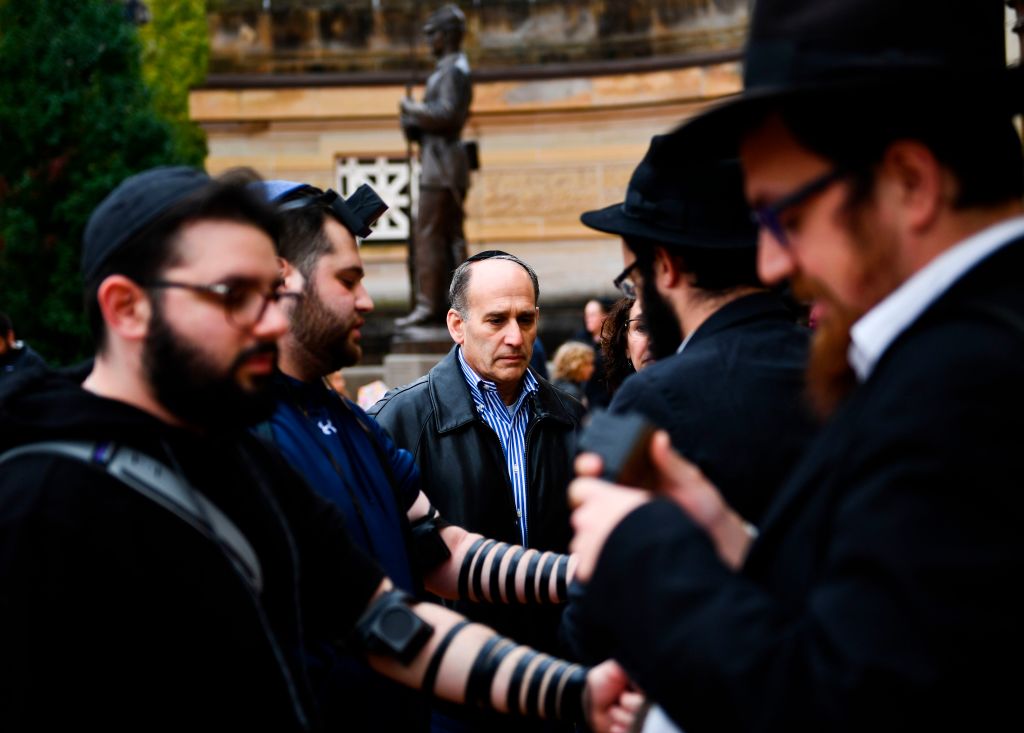Pittsburgh is less a city than a loose federation of urban villages, of which Squirrel Hill provides a classic example. A long-thriving heart of Jewish life and culture, an authentically rooted community, Squirrel Hill is now irrevocably scarred by the murderous actions of one monster, whose crimes will leave a legacy of social harm and intimidation for a generation.
Robert Bowers’s attributed words about wishing to kill Jews leave no doubt of the explicitly political character of the act. No worthwhile definition of terrorism could fail to include an act like this.
But as in any case of terrorism, identifying an act is only the first stage in a much larger process of interpretation and rhetorical expansion. As terrorism is universally recognised as an ultimate evil, then any cause or movement that can be linked to it, however plausibly, must be appallingly tainted. Social scientists call this a process of contextualisation or framing, explain that issue X is really a subset of larger issue Y.
After any act of leftist violence, conservatives will try and tar liberals with a degree of complicity. An Islamist onslaught will lead to denunciations of all Muslim leaders, and even of the faith of Islam as such. And in the Pittsburgh case which followed so closely on the recent mail bombs – liberals and progressives are in full cry not just against the far right, but against conservatives and Republicans in general, to an astonishing degree. The Nation is proclaiming that ‘The Pittsburgh Synagogue Shooting Is the Inevitable Result of Trump’s Vile Nationalism.’ Demonstrating the paper’s noted restraint and balance, the Washington Post merely asks, ‘How Much Responsibility Does Trump Bear For The Synagogue Shooting In Pittsburgh?’ (Hint to readers: ‘None’ is not an acceptable response). Slate recommends that readers ‘Stop Trying to Understand What Trump Says and Look at What His Followers Do.’ The Squirrel Hill attack is thus a manifestation of Trumpism, or even conservatism, and terrorists like Bowers or accused extremist Cesar Sayoc are the logical conclusion of those ideologies.
Such a process of guilt by association can have draconian policy consequences that run far beyond ideological scapegoating. After any terrorist assault, law enforcement attention inevitably turns to any movement that might have contributed to it. In the present case, we are dealing with the ultra-violent far right, and agencies are (and long have been) investigating and penetrating anti-Semitic and neo-Nazi groups and propagandists. Those agencies would be criminally irresponsible if they failed to do so, using their powers to the full legal extent to seek out and prosecute possible accomplices. But how widely should such investigations range into movements that are rightist or conservative, but which wholly reject illegal means? Drawing the line between acceptable and unacceptable advocacy can be a thorny dilemma.
Understanding these agendas – the politics of guilt by association – helps us to interpret media and political responses to any acts of domestic terrorism or political violence, and especially when the interpreters are liberals or progressives. Many cases are far less clear cut than the Squirrel Hill murders, and we regularly see random and inchoate attacks being presented as far more organised and ideological then they actually are. The prize example of such over-interpretation in the modern US occurred in 2011 when one Jared Lee Loughner attacked Representative Gabrielle Giffords in Tucson, killing several bystanders. Within hours of the attack, the media had firmly linked the crime to right-wing extremism, and more specifically to the then-booming Tea Party movement. Yet the amount of evidence supporting such a linkage was precisely zero, and Loughner was in fact a severely disturbed loner with grave mental health and substance abuse problems. His ideas, such as they were, were a weird mixture of anti-authority and conspiracy doctrines drawn from right- and left-wing sources alike.
Almost as predictable as the efforts to blame an attack on a particular cause are the attempts to avoid obvious associations, when those connections would produce undesirable results. Someone could write an excellent book on the aftermath of the hideous massacre carried out by Omar Mateen in Orlando in 2016, when he killed 49 patrons of a gay nightclub, Pulse. Mateen’s motives were perfectly clear. He had accepted radical Islamist ideology, as exemplified by the Islamic State movement, and he repeatedly and publicly identified with that cause: he was a soldier of the Caliphate. Before targeting Pulse, he had considered several other infidel sites for mass murder, including Walt Disney World. Yet immediately following the atrocity, the media en masse latched on to spurious claims that Mateen had himself patronised Pulse, so that he was evidently struggling with suppressed gay urges. A blatant act of Islamist terror thus led to ‘Orlando’ becoming a watchword for progressives in their ongoing battle against homophobia, and specifically, against Christian conservatives and the Roman Catholic Church. No, really: I actually saw Gay Pride parades right after the murders, in which the figure given the greatest stigma for the crime was the Pope. Islamists, it seems, don’t kill Americans: Christian conservatives kill Americans.
Scarcely more realistic was the response to the 2017 attack on several Republican Congressmen at a baseball tournament, in which Rep. Steve Scalise was gravely wounded. The casualty toll could very easily have been far worse. The perpetrator, James Hodgkinson, left abundant evident of his visceral hatred of Donald Trump, of Republicans and conservatives generally, and he was a dedicated supporter of Bernie Sanders’s movement. The attack was clearly the work of a would-be leftist assassin. Even so, virtually none of that context appeared in media accounts of the crime. Any attempt to attribute guilt to Sanders – to ask, for instance, ‘How Much Responsibility Does Sanders Bear?’ – would rightly have been regarded as ludicrous to the point of insanity.
One nightmare vision suggests that we may in the near future need yet again to confront and interpret acts of political violence. Far right militants have undoubtedly been emboldened in recent years, but so have those of the progressive left. During the recent fervour over Brett Kavanaugh’s Supreme Court nomination, fantasies of violent action have become alarmingly common on the left, at a time when activists have physically confronted conservative politicians they despise. In suggesting that the odds of actual personal violence in the coming months are very high, I am saying nothing that is not agonisingly familiar to law enforcement agencies. The more we spread the net of alleged guilt for horrendous acts, the more fuel we supply to real-world extremism and vigilantism.
Philip Jenkins is an author and researcher specialising in Christianity and 20th century history.


















